Hardware App Development Company
From first connection to a full-featured app. We build companion apps that connect hardware devices with users through BLE, Bluetooth Classic, Zigbee, Matter, USB, or Serial protocols.
BLE & Bluetooth-enabled mobile apps for smart devices and wearables
Integration of Matter, Zigbee, NFC, Serial, USB & vendor-specific SDKs
Real-time hardware communication & telemetry
Hardware App Development: Market Overview
From fitness and eMobility to healthcare, smart home, and beyond – companion apps turn modern devices into scalable digital products. As a hardware mobile app development company, Stormotion supports a wide range of devices, industries, and connectivity standards.
Wireless Short-Range Protocols: BLE & Bluetooth Classic for fitness machines, wearables, e-scooters; Zigbee, Matter, Z-Wave for smart home automation; NFC for access control & payments.
Wireless Long-Range Connectivity: Wi-Fi for consoles, hospital devices, and smart appliances; LoRaWAN, NB-IoT, and LTE-M/5G IoT for fleet management, agriculture, and large-scale monitoring.
Wired Protocols & Interfaces: USB and Serial for diagnostics and device control; Ethernet for industrial panels and charging stations.
Application-Level Protocols & SDKs: MQTT and CoAP for telemetry and cloud messaging; vendor SDKs and APIs (e.g. e-scooter or battery OEMs, Garmin, Fitbit) for native integrations.
Market Outlook: The worldwide connected device market growth expectations by 2030:
+$3 Trillion
Global connected device market value
20%
Compound annual growth rate (CAGR)
Our Hardware App Development Services
Custom BLE-Enabled Mobile Applications
Our team designs and builds cross-platform apps that connect to BLE peripherals – from fitness machines and wearables to e-scooters and medical devices.
Stable pairing, reconnection logic & background sync
Parsing and communicating with custom BLE protocols
Advanced features: OTA updates, signal monitoring
Protocol-Driven Integrations
We implement robust communication logic based on GATT specifications, vendor SDKs, and IoT standards, powering fitness, eMobility, and smart home devices.
JSON-based & proprietary BLE protocol integrations
Zigbee, Matter, Z-Wave & NFC support at the application level
Companion apps for smart home appliances & automation systems
Rebuilding OEM & White-Label Apps
Many hardware vendors ship generic white-label apps that lack UX, branding, or scalability. We rebuild them from scratch into modern, branded solutions.
Replacement of OEM apps
Custom UI/UX, scalable architecture, improved performance
Migration to React Native and modern frameworks
IoT Applications with Cloud Integration
Our engineers build apps and backends that connect hardware to the cloud for real-time data, control, and analytics.
Mobile ↔ hardware ↔ cloud communication flows
Real-time dashboards & telemetry visualization
Fleet management, logistics & agriculture tracking apps
AWS, Firebase, or NestJS-based backends
Kiosk & Embedded Android Applications
As a part of our hardware mobile app development services, we create Android apps for consoles, terminals, and kiosks.
Custom launchers for fitness machines & kiosks
Apps for EV charging/payment terminals (e.g., Valina)
Offline/semi-connected functionality mode support
Wearable & Healthcare Companion Apps
We develop apps that connect to wearables, health trackers, and medical devices – secure, user-friendly, and integrated with health platforms.
BLE or Wi-Fi communication with wearables & sensors
Integration with Apple Health, Google Fit & Fitbit APIs
Patient monitoring dashboards & medical console apps
Real-Time Hardware Control & Interaction
Our developers enable apps to safely trigger and manage device actions across eMobility, smart home, and hospitality hardware.
Lock/unlock, start/stop, calibration, device configuration
USB, Serial, or SDK-driven command patterns
Hospitality apps: BLE hotel keys, guest access systems
Product Discovery & Touch-First UX
We support teams from the earliest stage – mapping device interactions, validating protocols, and designing touch-first UX for hardware.
UX research & product flow mapping
Touch-first UIs for limited-space screens (e.g., wearables)
Protocol validation & failure handling before development
Why Our Hardware Mobile App Development Company?
Proven Experience with Hardware Apps
We’ve built companion apps for fitness machines, EV chargers, e-scooters, batteries, and beyond – supporting both startups and industry leaders since 2017.
Deep Protocol & Connectivity Expertise
From BLE and GATT services to Zigbee, Matter, USB, and Serial – we integrate hardware devices at the application level with stable, reliable communication.
Testing on Real Hardware Devices
We collaborate closely with your hardware team and run extensive testing on physical devices to guarantee stable connections and reliable performance.
Partner Mindset & Co-Creation
We work side by side with your team, taking ownership and co-creating products that scale – not as contractors, but as long-term partners.
Hardware App Development Services: Our Focus Areas
- Fitness & Connected Equipment
- EV & eMobility
- Healthcare & MedTech
- Smart Home App
- Hospitality & Access Control
- Retail & Warehousing
- Logistics & Fleet Management
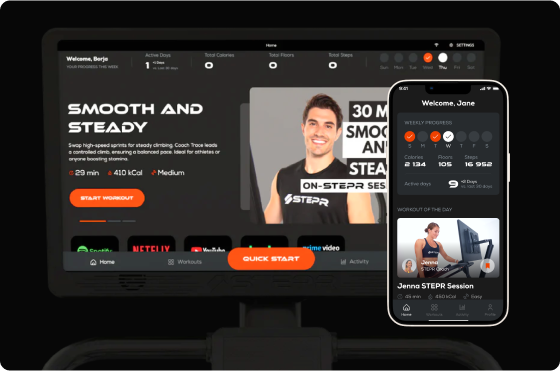
STEPR (image by Stormotion)
Fitness & Connected Equipment
Connected fitness products need apps that are stable, engaging, and easy to use. Our team develops BLE-enabled companion apps and Android-based console software for treadmills, stair-climbing machines, bikes, and wearables. By combining reliable connectivity with seamless HealthKit and Google Fit integration, we make training data accessible, motivating, and ready for scaling.
BLE pairing & reconnect logic
Console apps & kiosk interfaces
HealthKit, Google Fit & Fitbit integrations
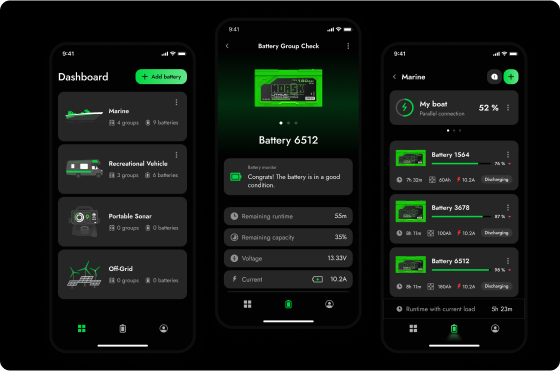
Norsk Guardian (image by Stormotion)
EV & eMobility
eMobility apps require real-time performance, robust integrations, and smooth UX. As a hardware mobile app development agency, we support EV charging providers, e-scooter/bike, and battery manufacturers with companion apps that enable payment, monitoring, and control. From Android apps on terminals to BLE and vendor SDKs and APIs integrations for vehicles, our team delivers secure and scalable mobility software.
Android apps for payment & charging terminals
BLE & SDKs integrations for e-scooters and batteries
Real-time charging status & remote diagnostics
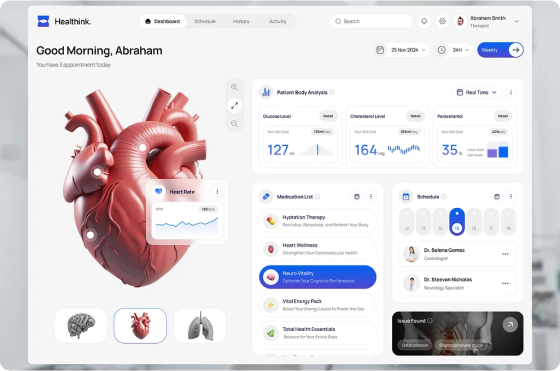
design by @OnPoint Studio
Healthcare & MedTech
Reliability and compliance are critical for healthcare apps. We work with medical device teams to create secure companion apps for sensors, consoles, and patient monitoring solutions. With GDPR/HIPAA compliance, real-time visualization, and integration into clinical workflows, our apps combine safety with usability.
Patient monitoring apps for BLE-enabled medical devices
Secure dashboards with GDPR/HIPAA-compliant data handling
Real-time visualization of health metrics
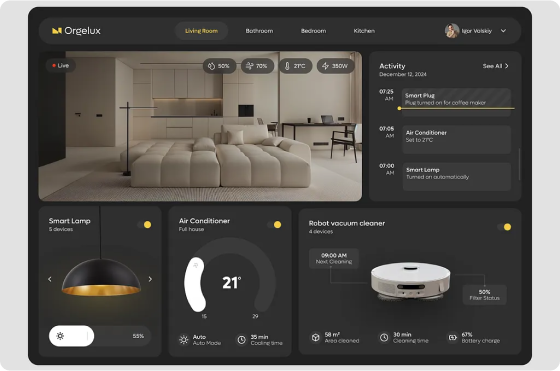
design by @Bato
Smart Home & Consumer Devices
From appliances to security systems, smart home devices need companion apps that connect multiple standards in a user-friendly way. As a part of our hardware mobile app development service, we build apps that integrate Matter, Zigbee, Z-Wave, Wi-Fi, and NFC devices into a seamless experience, enabling users to monitor and control their homes with a single interface.
Integration with Matter, Zigbee, Z-Wave & Wi-Fi devices
Remote monitoring & control from mobile dashboards
Companion apps for appliances, vacuums & thermostats
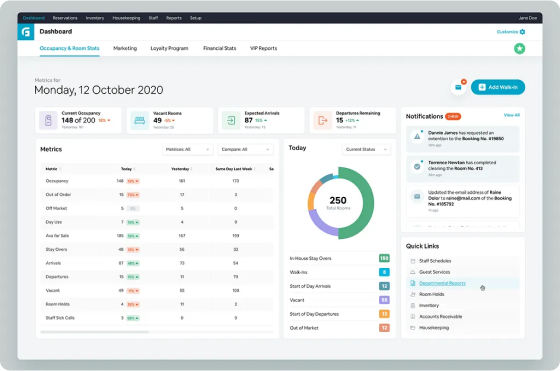
design by @Nimasha Perera for Dreamten
Hospitality & Access Control
Guest experience is shaped by speed, simplicity, and trust. Our team designs BLE-enabled access apps, self check-in/out flows, and in-room control apps for hotels, gyms, and co-working spaces. Our solutions replace plastic cards and paperwork with secure, mobile-first experiences that work reliably across devices.
BLE-based mobile keys & access systems
Check-in/out apps with secure authentication
Companion apps for in-room controls & services
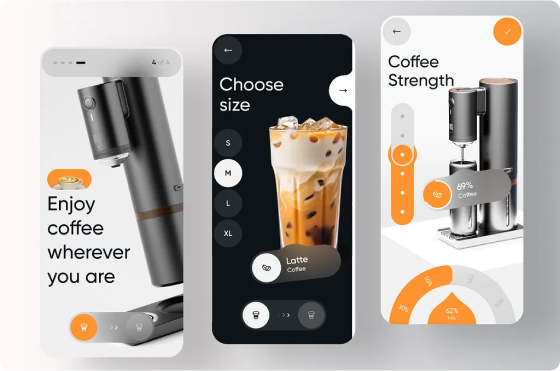
design by @Stan D
Retail & Warehousing
Efficiency in retail and warehousing depends on accurate data and responsive interfaces. We create apps that connect vending machines, shelves, and warehouse systems with mobile dashboards. From RFID-based stock tracking to indoor navigation, our apps improve visibility, reduce waste, and streamline daily operations.
Apps for vending machine or shelf monitoring
Warehouse apps with RFID/barcode scanning
Indoor navigation & stock management tools
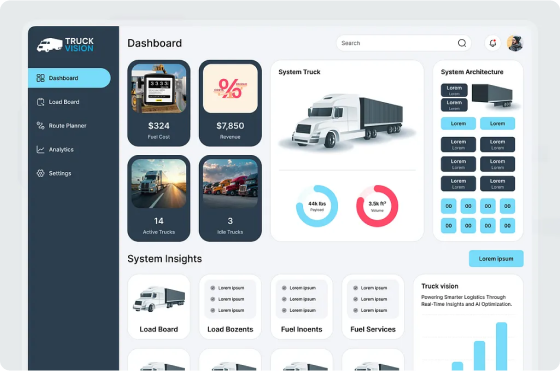
design by @Creativilo
Logistics & Fleet Management
Fleet and logistics teams need real-time visibility into vehicles, cargo, and routes. We build apps that collect telemetry from sensors, track assets remotely, and visualize performance in dashboards. By combining BLE and cellular IoT, our hardware app development services support both mobility startups and large logistics providers.
Remote monitoring of vehicles & fleets
Cargo and container asset tracking
Telemetry dashboards with sensor data
Our Process for Hardware App Development
Our Hardware App Development Projects
Tech Stack for Hardware App Development
- iOS
- Android
- React Native
Programming Languages & Frameworks:
TypeScript, Kotlin, Swift; React, React Native, Expo, NestJS, Next.js, Gatsby, Hasura
Protocols & Connectivity:
wireless short-range (BLE, Bluetooth Classic, Zigbee, Matter, Z-Wave, NFC); wireless long-range (Wi-Fi, LoRaWAN, LTE-M, NB-IoT, 5G IoT); wired interfaces (USB, Serial, Ethernet, CAN Bus)
SDKs & APIs:
react-native-ble-plx, react-native-bluetooth-classic, react-native-ble-manager, Nearby API, Apple HealthKit, Google Fit SDK, vendor SDKs (e.g. Garmin, Fitbit), CoreBluetooth (iOS), BluetoothGatt (Android)
Backend & Data:
Prisma, Drizzle ORM, PostgreSQL, Redis, Firebase, AWS SDK, Google Cloud SDK, BullMQ, AWS IoT Core, Azure IoT Hub
Testing & QA:
Detox, Maestro, Jest, Playwright, React Native Testing Library, Storybook, Firebase Test Lab (real devices)
CI/CD & Delivery:
Fastlane, Expo EAS, GitHub Actions, Microsoft App Center
Analytics & Monitoring:
Firebase Analytics, Amplitude, Sentry, Datadog, Microsoft Clarity
AI & Machine Learning:
TensorFlow, Google ML Kit, Firebase ML, OpenAI SDK
FAQ: Hardware Mobile App Development Services
What is hardware app development?
Hardware app development is the process of building mobile or web applications that connect to physical devices. These apps act as companion software for fitness machines, EV chargers, wearables, smart home devices, and more. By using protocols such as BLE, Zigbee, Matter, USB, or Serial, a hardware mobile app development company enables users to monitor, control, and interact with their devices through intuitive digital interfaces.
Do you develop firmware or hardware components?
No. Instead, we focus on hardware mobile app development at the application level. That means building mobile, web, and kiosk apps that communicate with your device via BLE, USB, Zigbee, Serial, Matter or vendor SDKs. We collaborate with your hardware engineers and test against real devices to ensure the connection works reliably.
Which types of devices can Stormotion connect with apps?
Stormotion builds companion apps for a wide range of hardware. This includes fitness machines, e-scooters, marine batteries, EV charging stations, medical devices, consumer wearables, smart home appliances, vending machines, and agricultural sensors.
If your hardware communicates via BLE, Serial, Zigbee, Matter, or vendor SDKs, we can integrate it at the application level. Our expertise is in creating reliable user-facing apps that connect devices with cloud backends and mobile platforms.
Which protocols do you support?
Our scope covers the GATT level and above. We support BLE and Bluetooth Classic, Zigbee, Matter, Z-Wave, NFC, Wi-Fi, and USB/Serial (UART, RS-232, RS-485). We also integrate application-level SDKs and APIs from hardware vendors, such as e-scooter OEMs, Garmin, or Fitbit. Unlike firmware teams, our hardware app development services focus on app-side communication and user experience.
What is the best company for hardware app development?
The top hardware app development company is one that combines mobile expertise with hands-on hardware integration. It should support a variety of protocols like BLE, Zigbee, Matter, Serial, or USB, and have proven experience in industries such as fitness, eMobility, or healthcare.
Stormotion has delivered projects for connected fitness machines, EV chargers, marine batteries, and e-scooters, making us one of the trusted partners for businesses seeking reliable companion apps for hardware.
Is it worth hiring a hardware mobile app development company?
Yes, hiring a dedicated hardware app development company is worth it. Connecting hardware with apps requires expertise in protocol integrations and real-device testing. The best hardware app development company ensures your companion app is scalable, secure, and intuitive, reducing risks and time-to-market. At Stormotion, we specialize in building hardware software that transforms devices into engaging digital products used daily by customers.
Why choose Stormotion for hardware app development?
Because we combine technical depth with a partnership mindset. Our development team validates protocols early, tests on real devices, and co-creates with your hardware team to deliver reliable, scalable apps. Our portfolio in fitness and EV proves we can turn complex hardware into intuitive digital products that engage users and support business growth.
How do you test hardware apps?
During discovery, we validate the provided protocol (BLE, Serial, Zigbee, etc.) to ensure communication works. Throughout the project, we continuously test on physical hardware under real-world conditions to guarantee connection stability, security, and performance.
Our hardware mobile app development services combine automated QA, manual testing, and device-specific checks to ensure the companion app works.
How long does it take to build a hardware companion app?
Most hardware companion apps take between 5 and 8 months to develop. The timeline depends on the complexity of the hardware integration, the number of supported platforms (iOS, Android, or web), and features such as real-time dashboards or cloud connectivity.
Our hardware mobile app development service ensures that discovery phase includes protocol validation, which reduces risks later in the process. This structured approach allows us to deliver reliable, scalable apps within predictable timelines.
How much does hardware app development cost?
At Stormotion, we usually work in development units. A unit includes full-time fullstack engineers, a part-time QA engineer, part-time UX/UI designer, and a part-time PM/Scrum Master. The cost of a development unit ranges from €10k–15k per month. Typical projects last 5–8 months, making the total cost for a hardware app project between €50k and €120k. This covers end-to-end hardware app development: protocol validation, design, engineering, testing, and launch.
What technologies do you use for hardware app development?
We often recommend React Native for mobile apps, with native bridges to handle BLE and hardware protocols. For kiosk and embedded use cases, we develop custom Android apps and launchers. Backends are usually built with Node.js, NestJS, Firebase, or AWS, depending on project requirements. Our team focuses on scalable, maintainable tech stack that supports real-time device communication, data visualization, and secure integrations.
Which industries do you work with?
Stormotion specializes in fitness and eMobility, with case studies like STEPR, SportPlus, Milence, Egret, and Norsk Guardian. We also develop apps for healthcare devices, smart home appliances, hospitality systems, retail automation, logistics, and agriculture. This versatility allows us to support any business that needs a companion app for hardware devices.
How is AI shaping hardware app development?
AI is increasingly used in hardware app development to enhance user experience and device intelligence. From predictive maintenance in EV batteries to personalized fitness recommendations in wearables, AI-driven insights make companion apps more valuable.
A hardware app development company like Stormotion can integrate AI models with app development, enabling smarter automation, real-time decision-making, and data-driven engagement for users.
What’s the future of BLE, Matter, and connected device protocols?
Standards like BLE, Matter, and Zigbee are driving the future of hardware connectivity. BLE app development continues to power wearables and fitness equipment, while Matter and Zigbee are becoming the default for smart home devices. As a top hardware app development company, Stormotion stays ahead of these trends, ensuring that your companion apps remain compatible, scalable, and ready for the next generation of hardware communication protocols.






Testimonials
SHUFFLE THROUGH THE SLIDER. DRAG OR SWIPE